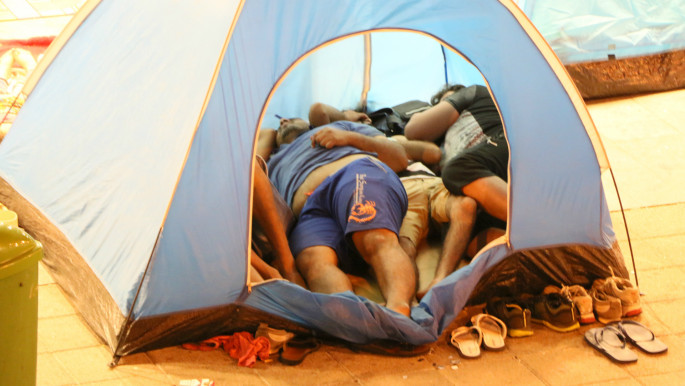Trains, treks and smugglers: refugees desperate to leave Hungary
After trains to Western Europe were cancelled on Thursday, and under threat of being forced into refugee camps, thousands of refugees who were stranded in Budapest station embarked on a 150-mile march to Austria.
On Friday night, the Hungarian government announced that they would provide buses to transport the refugees to the Austrian border.
Thousands of refugees on the march have now managed to leave Hungary and are applying for asylum in Austria or continuing their journeys to Germany.
However, Hungary said that the provision of buses is a "one-off" episode due to fears for the marchers' safety, and the fate of refugees still in Budapest or trying to make their way through the country to Western Europe, is still unsure.
Thousands of other refugees chose remain in Budapest, such as Abu Ali, a Syrian refugee from Damascus who was hesitant to join the march, fearing "the consequences, that are usually violent," he said.
Although the trek has now made it to Austria, his fears were not unfounded.
Abu Ali boarded a train two days ago, but it was stopped and refugees onboard were "violently ejected" by security forces. He escaped and walked back to the central train station 30km away.
"We were put in prison...a detention centre in all sense of the word, surrounded by wires...it reminded me of the concentration camps which we saw in films and photographs.
"There is no assistance for those who are outside refugee camps. Even those inside refugee camps only receive twenty euros a week and aren’t allowed to leave," he said.
Hungarian human rights groups have reported dire conditions inside the camps.
"Me and my wife and children fled, hoping to get out of Budapest...some were sent back to Serbia after they lost all their money between smugglers and try to stay alive," said Abu Mahmoud.
| We are here without any hope for the future -Um Souliman |
"What do we do now that we’ve found out that there aren’t any more trains and nowhere to take shelter other than the streets?" asked a young woman from a Damascus suburb, who also did not chose to join the march and is waiting in limbo in Budapest.
Hungary criminalizes homelessness, and on Friday debated a law that would also forbid sheltering refugees.
"This is the worst feeling of displacement we have experienced since we lost our homes in the countryside of Latakia," said Fatima who is staying in the station with four children.
"Everything here shows the horror of Hungarian police...only God knows how me, my children and my husband will find an end to this suffering after passing through all these countries to reach Germany. We are here without any hope for the future."
Meanwhile, in Bicske, some 40km west of Budapest on the way to Austria, over 500 refugees were stranded on Thursday, when Hungarian police stopped two trains in an attempt to eject them and the refugees refused to leave the trains.
Refugees in Hungary who are not registered in refugee camps are now considered fugitives that can be imprisoned, according to Hungarian refugee activists.
Many refugees have complained of their ill treatment at the hands of Hungarian authorities, who in turn justify their actions as being in line with European Union regulations requiring the registration and fingerprinting of refugees according to the Dublin Regulation.
Omar, a Kurd from Kobani criticized that "manipulation campaigns in Hungary that makes them equal to a terrorist...I don’t understand the authorities," he said.
 |
|
| A "five-star residence" compared to refugee camps [al-Araby] |
Many have said that the crisis draws attention to the viability of applying the Dublin convention, which requires refugees to register in the first European country they arrive in.
"How do you want the Hungarian authorities on the one hand to apply the Dublin Convention, and fingerprint refugees by force. On the other hand thousands are gathered here after the authority " said Ismail Sobha from Latakia.
While thousands of refugees have managed to enter the Austrian border in the last 24 hours, the Hungarian government has refused to provide more buses, leaving thousands still stranded in Budapest.
Those that remain are now considering paying smugglers to transport them into Western Europe.
"There is no way other way, I’ve been out of Turkey through Macedonia and Serbia and to Hungary and when we see how they treat the refugees, we want find smuggler to go through to Vienna," said Ismail.
Smugglers have been also used to transport refugees within the Schengen area from Greece and Italy. Experts have said that by refusing to give refugees travel documents to continue their journey, EU policy is pushing refugees into the hands of traffickers.
Although the international media attention may have gained a positive outcome for those thousands of refugees who took a gamble and joined the march to Austria, for those in Budapest, or across a fenced border in Serbia, their futures remain uncertain.
Meanwhile many commented on the ironic comparison of the march undertaken by refugees to reach the Austrian border to the journey that Hungarians made in 1956 while fleeing the Russian invasion of Budapest.
|
— Conflict News (@Conflicts) September 4, 2015" style="color:#fff;" class="twitter-post-link" target="_blank">Twitter Post
">
|
Reporting by Naser Salahi. Additional writing and reporting from Imogen Lambert.

![Palestinians mourned the victims of an Israeli strike on Deir al-Balah [Getty]](/sites/default/files/styles/image_684x385/public/2024-11/GettyImages-2182362043.jpg?h=199d8c1f&itok=xSHZFbmc)


![The law could be enforced against teachers without prior notice [Getty]](/sites/default/files/styles/image_684x385/public/2178740715.jpeg?h=a5f2f23a&itok=hnqrCS4x)
 Follow the Middle East's top stories in English at The New Arab on Google News
Follow the Middle East's top stories in English at The New Arab on Google News


